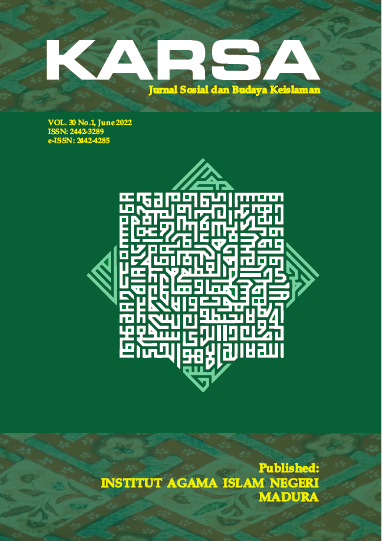The Governance of Ex-Indonesian Migrant Workers Empowerment Based on Entrepreneur Skill in Malang
 Abstract views: 504
,
Abstract views: 504
,
 PDF downloads: 359
PDF downloads: 359
Abstract
This study aims to understand the process of ex-Indonesian migrant workers’ empowerment through the Productive Migrant Village (Desmigratif) program in Arjowilangun Village. In this study, the writers use a qualitative approach because they want to directly observe the empowerment of ex-Indonesian migrant workers (PMI) in Arjowilangun Village. The research type used in this study is a case study. The data collection techniques are observation, interview, and documentation. Desmigratif program has several focused activities. One of them is to develop productive businesses. These productive business activities aim to help the growth of the entrepreneurship spirit of ex-Indonesian migrant workers and improve their confidence and welfare. The purposes and the main focuses of this study are to know and to decipher as follows: (1) various efforts that are done in the empowerment of ex-Indonesian migrant workers through productive business activities; (2) various factors that can support and detain the effort of ex-Indonesian migrant workers’ empowerment in Arjowi-langun Village. The result of this study shows that Desmigratif Program in Arjowilangun Village has run well. Still, the empowerment process of ex-Indonesian migrant workers in Arjowilangun Village is not yet maximum. It is caused by the lack of capital assistance in productive business activities and the minimum knowledge of ex-Indonesian migrant workers about marketing.
Downloads
References
Bachtiar, Nasri. “Blue Print Peningkatan Kebijakan Ekspor Jasa Tenaga Kerja Indonesia (TKI) Ke Luar Negri.” In Lokakarya Keternagakerjaan. Sumatera Barat: BAPPEDA Tk I. Provinsi Sumatera Barat, 2004.
BNP2TKI. “Data Penempatan dan Perlindungan PMI Periode Tahun 2018.” Jakarta Selatan, 2018.
Farazmand, Ali. Sound Governance: Policy and Administrative Innovations. Westport: CT: Praeger Publishers, 2004.
Fung, Archon. “Citizen Participation in Government Innovations.” In Innovations in Government. Research, Recognition, and Replication, USA: Institute for Democratic Governance and Innovations y Harvard University, edited by S. Borrins, 52–70. Washington D.C: Brookings Institution Press, 2008.
Huberman, A. Michael, and Johnny Saldana. Qualitative Data Analysis: A Methods Sourcebook. Translated by Rohondi Rohid Tjatep. The SAGE Handbook of Applied Social Research Methods. 3rd ed. USA: UI-Press, 2014.
International Labor Organization. “Training Employment Services Providers on How To Facilitate The Recognition of Skills of Migrant Workers.” Last modified September 1, 2020. https:// www.ilo.org/wcmsp5/groups/public/---ed_protect/---protrav/---migrant /documents/publication/wcms_748722.pdf.
International Labor Organization. “Skills for Migrant Workers.” Last modified June 2, 2021. https://www.ilo.org/skills/areas/skills-for-youth-employment/WCMS_748802/lang--en/index.htm.
International Organization for Migration. “New skills training aims to help returnee migrant workers affected by COVID-19.” Last modified August 15, 2021. https://www.iom.int/news/new-skills-training-aims-help-returnee-migrant-workers-affected-covid-19.
Joseph, Rigaud. “The theory of empowerment: A critical analysis with the theory evaluation scale.” Journal of Human Behavior in the Social Environment 30, no.2 (2020): 138-157. https://www.tandf online.com/doi/abs/10.1080/10911359.2019.1660294?journalCode=whum20.
Kasmir. Kewirausahaan. Jakarta: Rajawali Pers, 2010.
Mardikanto, T., and P. Soebianto. Pemberdayaan Masyarakat. Bandung: Alfabeta, 2015.
Michels, Ank, and Laurens De Graaf. “Examining Citizen Participation: Local Participatory Policy Making and Democracy.” Local Government Studies 36, no. 4 (2010): 477–91. https://doi.org/ 10.1080/03003930.2010.494101.
Nuraeni, Yeni. “Pembangunan Desa Migran Produktif (Desmigratif) Dengan Pendekatan Perencanaan Secara Holistik, Temanik, Integratif, dan Spasial. ” Jurnal Ketenagakerjaan 16, no. 1 (2021): 29-47. https://journals.kemnaker.go.id/index.php/naker/article/ view/90.
Republik Indonesia. Instruksi Presiden Republik Indonesia Nomor 4 Tahun 1995 Tentang Gerakan Nasional Memasyarakatkan dan Membudayakan Kewirausahaan (1995).
Kementerian Ketenagakerjaan Republik Indonesia. Keputusan Menteri Ketenagakerjaan Republik Indonesia Nomor 59 Tahun 2017 tentang Desa Migran Produktif (2017).
Kementerian Ketenagakerjaan Republik Indonesia. Undang-Undang Republik Indonesia Nomor 18 Tahun 2017 Tentang Pelindungan Pekerja Migran Indonesia (2017).
Rusyan, Tabrani. Manajemen Pengembangan Desa Produktif. Jakarta: Bumi Aksara, 2018.
Shabira, Muhammad Umar. Ar-Ru`yah Al-Islamiyah Lil Tanmiah Fi Dhu`i Maqashid as-Syariah. Jeddah: Majmuah Bank al Islamy, n.d.
Shihab, M.Quraish. Membumikan Al-Qur’an: Fungsi dan Peran Wahyu Dalam Masyarakat. Bandung: Mizan, 2004.
Tholen, Berry. “Citizen Participation and Bureaucratization: The Parti-cipatory Turn Seen through a Weberian Lens.” International Review of Administrative Sciences 81, no. 3 (September 14, 2015): 585–603. https://doi.org/10.1177/0020852314548152.
United States Department of State Publication Office. “Trafficking in Persons Report June 2020.” Last modified June 1, 2021. https:// www.state.gov/wp-content/uploads/2020/06/2020-TIP-Report-Complete-062420-FINAL.pdf
Widjaja, A.W. “Pemerintahan Desa/Marga Berdasarkan UU. No. 22 Tahun 1999 Tentang Pemerintah Daerah.” Jakarta: Raja Grafindo Persada, 2003.
Wirasasmita, Yuyun. Komunikasi Bisnis dan Profesional. Bandung: Remaja Rosda Karya, 2010.
The journal operates an Open Access policy under a Creative Commons Non-Commercial Share-Alike license. Authors who publish with this journal agree to the following terms:
- Authors retain copyright and grant the journal right of first publication with the work simultaneously licensed under a Creative Commons Attribution License that allows others to share the work with an acknowledgement of the work's authorship and initial publication in this journal.
- Authors are able to enter into separate, additional contractual arrangements for the non-exclusive distribution of the journal's published version of the work (e.g., post it to an institutional repository or publish it in a book), with an acknowledgement of its initial publication in this journal.
- Authors are permitted and encouraged to post their work online (e.g., in institutional repositories or on their website) prior to and during the submission process, as it can lead to productive exchanges, as well as earlier and greater citation of published work.



















